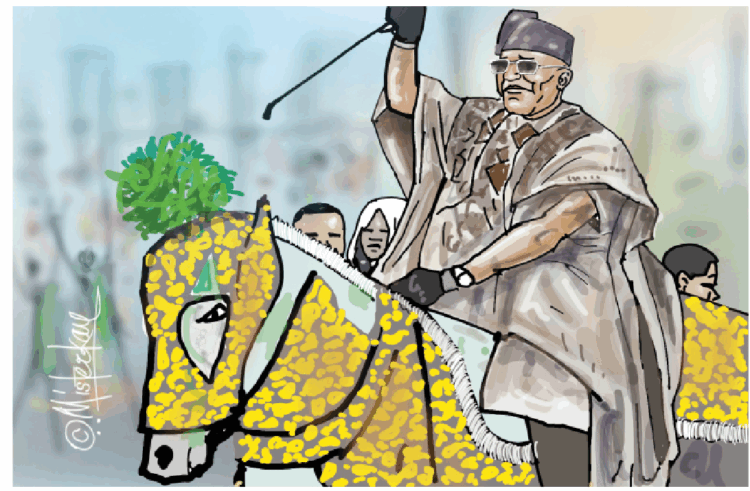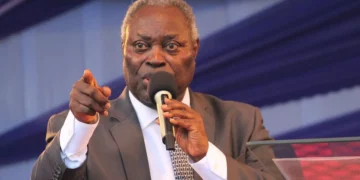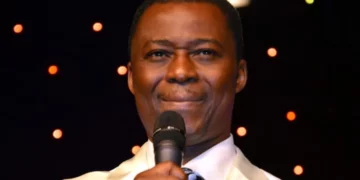Every year, on the third day after Eid-el-Kabir, the ancient town of Ijebu-Ode in Ogun State, Southwest Nigeria transforms into a vibrant cultural stage for the Ojude Oba festival—a spectacular convergence of tradition, religion, and royalty that celebrates Yoruba identity and communal pride.
What began as a modest homage to a monarch by early Muslim converts in the 19th century has evolved into one of Nigeria’s most vibrant displays of cultural heritage, showcasing the power of tradition to unite, inspire, and renew.
Ojude Oba, “the King’s forecourt” in Yoruba, is not just a festival. It is a symbolic act of homage, a living record of Ijebu history, and a reminder of how Nigeria’s diverse cultures can exist in harmony. In an era when modernity often threatens to erase tradition, Ojude Oba stands tall as a beacon of cultural resilience and pride.
History has it that long before Christianity and Islam, there was the Ode Nla Festival, a practice of paying homage to the monarch, ‘Awujale’ of Ijebu land by dignitaries and subjects with their symbols of worship. This practice morphed into Ojude Oba as we know it today during a time of religious transition.
A Cultural History Rooted in Identity
In the 1800s, as Christianity expanded into Ijebu-Ode, monogamy was a condition for new converts. Balogun Kuku, a wealthy and influential man with more than thirty wives and hundreds of slaves, converted to Islam instead, which had no restrictions, and influenced many Ijebus.
Earlier, Balogun Kuku led the Ode Nla Festival honouring deities and the Awujale. Islam however, discouraged such practices. Rather than abandoning the festival, he initiated a new festival called Ita-Oba festival, later renamed Ojude Oba aligning with his faith that preserved respect for culture. This quickly became a beloved tradition featuring a colourful cultural carnival with elaborate processions, competitions, horse-riding displays, music, fashion, and the full splendour of Ijebu pageantry.
At the heart of Ojude Oba lies a carefully curated cultural architecture and richness epitomised by the parade of age grades known as Regberegbe groups. These social clubs, organised by age and gender, have existed for centuries. Each group dons strikingly coordinated attire and takes turns to salute the Awujale, showcase their community projects and achievements, and demonstrate unity, wealth, and creativity.
Next are the aristocratic Baloguns—descendants of Ijebu warlords—who arrive on horseback in regalia reminiscent of ancient warriors. Their equestrian parades, often choreographed to drums and praise chants, embody the martial history of the Ijebu people and serve as a living bridge between the past and present.
Ojude Oba is also a major fashion statement and a makeshift runway for Yoruba haute couture of aso-oke, damask, lace, embroidery, beadwork, and luxurious gele and fila headwear come together in an explosion of elegance and pride. In recent years, fashion influencer Farooq Oreagba, aka Mr. Steeze, has dominated the festival’s style scene. He describes Ojude Oba as a “leveller” where all members of age groups, regardless of wealth or status, come together in shared celebration.
A Platform for Social and Cultural Cohesion
In Nigeria’s complex mosaic of religion and ethnicity, Ojude Oba offers a powerful counter-narrative of social cohesion, culture, history, identity and civic responsibility welcoming Muslims, Christians, and followers of African traditional religion alike. The presence of dignitaries, traditional rulers, politicians, business leaders, and citizens from across Nigeria underscores the unifying power of culture.
Beyond its symbolic and historical significance, Ojude Oba is a major economic driver for the region. The festival attracts thousands of visitors annually, including members of the Ijebu diaspora, tourists, scholars, and culture enthusiasts. Hotels, restaurants, tailors, event planners, photographers, traders, and transport operators all benefit from the massive influx of people. The town’s economy receives a significant boost and patronage each year.
Corporate sponsorship from telecoms, banking, and consumer goods companies has professionalised festival management, blending tradition with commerce. This partnership highlights how cultural heritage can be ethically monetised, preserving authenticity while enabling growth.
The festival has gained international attention, with media coverage spreading across Africa and the diaspora. For Nigeria, a country still battling to diversify its economy beyond oil, Ojude Oba is a compelling case study in how cultural tourism can be developed into a viable industry. It is also an opportunity to tell positive stories of beauty, resilience, tradition, and pride about the country.
In many societies today, the allure of global pop culture has eroded indigenous traditions. Festivals like Ojude Oba, however, prove that modernisation need not come at the cost of cultural identity. The festival affirms Ijebu, Yoruba, and Nigerian heritage, providing younger generations with a strong sense of belonging and pride.
The festival also serves as an important archival function. The processions, songs, attire, and oral histories recited during the celebrations contribute to the preservation of cultural knowledge that might otherwise be lost. In a world where language and tradition are increasingly endangered, such festivals are a lifeline.
There is growing advocacy for Ojude Oba’s recognition by UNESCO as part of Nigeria’s intangible cultural heritage. Such status would bring global attention and stimulate investments in infrastructure and preservation.
Leadership and Legacy
The current Awujale of Ijebu land, Oba Sikiru Kayode Adetona, has played a monumental role in nurturing the festival, elevating it to national prominence. Since his ascension to the throne in 1960, he has led with vision, wisdom, and an unwavering commitment to preserving Ijebu culture.
Under his reign, the festival has transformed from a local Islamic observance to a globally recognised cultural event. His efforts to institutionalise the Regberegbe system, modernise the palace infrastructure, and promote Ijebu unity have had a lasting impact. Ojude Oba, under his guidance, has become both a mirror and a map—a reflection of Ijebu’s past and a guide to its future.
The role of traditional institutions in modern Nigeria has been widely debated, especially in the context of governance, democracy, and development. Ojude Oba offers a powerful rebuttal to those who dismiss traditional leadership as outdated and shows how culture and leadership can intersect to strengthen social capital, drive development, and instil values.
As we move deeper into the 21st century, the relevance of festivals like Ojude Oba becomes even more critical. Nigeria faces immense challenges, economic uncertainty, insecurity, political disillusionment, and social fragmentation. In such times, people often look to tradition for stability, meaning, and hope. Culture becomes a compass, proof that faith and tradition can coexist, that history must be celebrated and not forgotten, and that leadership rooted in service and vision can truly transform communities.
To sustain the festival’s momentum, deliberate efforts must be made to document its history, mentor the next generation of organisers, and develop infrastructure that can support its growing scale. Policymakers must begin to treat cultural festivals as strategic assets worthy of investment, protection, and global promotion.
Ojude Oba is more than a festival, it is a living monument to Ijebu ingenuity, a ceremonial embrace of history, and a vibrant testament to the enduring power of culture. In a country often caught in the throes of division, it offers a teachable moment in unity and identity.
The 2025 Ojude Oba was not just another spectacular array of culture and tradition, beauty and pageantry but also a reflection on the concept of community, resilience, and the limitless potential of culture as a force for good.











